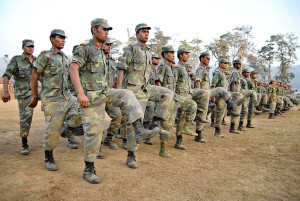Reporting from Katmandu, Nepal, and New Delhi — Nepal took a step closer toward a comprehensive peace deal with an agreement to integrate about 6,500 former Maoist fighters into the nation’s armed forces and offer compensation packages to other ex-rebels.

In a seven-point interim deal forged late Tuesday, the Himalayan nation’s four major political parties also agreed to complete the stalled peace process within a month, hand over property seized during the civil war and prepare a draft constitution.
“I’m optimistic,” said Anagha Neelakantan, a Katmandu-based senior analyst with the International Crisis Group, a nonprofit organization that studies conflicts. “It contains specifics, unlike previous agreements. It’s also broad-based, with a range of political parties signing on.”
Figuring out what to do with more than 19,000 former rebels, many poorly educated and with few marketable skills, has been a major stumbling block since the Maoists ended their armed struggle in 2006.
Many in the army have resisted the introduction of former enemies into their ranks, citing the Maoists’ lack of military discipline, although a bridge training program lasting up to two years should address some of those concerns.
Under the agreement, former rebels selected on the basis of fitness, age and other criteria will join the military but will be limited to noncombat roles, such as forest conservation, industrial security and social development work.
“The agreement is what the people have been anticipating for a long time,” said Maoist leader Pushpa Kamal Dahal, whose party is the largest in parliament. “It is now our challenge to complete the peace process.”
Even optimists acknowledge that a large dollop of caution is in order. The country has had four governments since elections in April 2008 and has blown three deadlines for drafting a constitution.
“We’ve had three-point agreements, four-point agreements, six-point agreements,” said Nihar Nayak, associate fellow at the Institute for Defense Studies and Analyses in New Delhi. “We can’t say this is the end of political standoffs in Nepal.”
The deal’s one-month timeline for integrating former Maoist fighters and reaching a peace agreement is too short, analysts said, given the high likelihood of hiccups.
Returning land seized during the civil war to the original owners also will be difficult. In some cases, parcels have since been sold repeatedly; in others, Maoist cadres probably will refuse to give them back.
And there are also cracks within the Maoist camp, where hard-liners have already voiced opposition to the deal. Among their demands: that more of the former fighters receive jobs in the armed forces, that they receive combat roles and that entire fighter units be transferred intact.
The 12,500 fighters not brought into the armed forces will receive cash settlements of $6,200 to $11,500, depending on their rank. The compensation is intended to give them a new start, including pursuing an education or vocational training. The fighters have been in United Nations-monitored camps.
“The camp was only supposed to be for six months, but we’ve stayed five years,” said Tej Bahadur Oli, 37, a Maoist commander with the 4th Division. He said he’ll take his cue on whether to apply for an armed forces job from the party leadership. “Although the agreement isn’t clear [on] what ranks will be integrated into the army, we feel it’s very positive.”
The protracted political crisis and lack of movement toward a constitution, decentralized power structure or peace agreement has hurt a nation struggling with poverty and the aftermath of war.
The government has often failed to provide basic services as key positions go unfilled and political thugs replace police or courts as the arbiters of disputes.
Nepalis cautiously welcomed news of the deal and the prospect of better times ahead.
“After a five-year political vacuum, I hope this agreement will be implemented,” said Rudra Dahal, 44, a shopkeeper in Katmandu, the capital. “If the political parties miss this chance, I’m afraid there will only be more conflict.”
Special correspondent Bhandari reported from Katmandu and Times staff writer Magnier from New Delhi.
http://articles.latimes.com/2011/nov/03/world/la-fg-nepal-maoists-deal-20111103

+There are no comments
Add yours